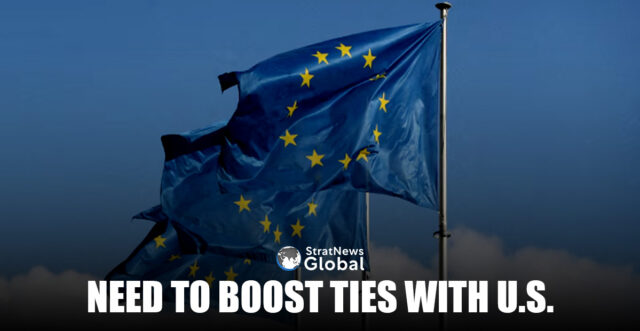European Union finance ministers have reached a consensus to maintain a unified stance toward the new U.S. administration.
They stressed that strengthening the EU’s economic competitiveness is the most effective safeguard against potential transatlantic economic challenges.
Need For Deeper Ties With U.S.
At an informal dinner on Monday, the EU’s 27 finance ministers also agreed that deeper ties with the U.S. were in the best interests of both the EU and the U.S., EU diplomats familiar with the discussions said.
The ministers also agreed that low and stable energy prices were key to prosperity in Europe.
This is because the bloc’s industry and consumers pay two times as much as their counterparts in the U.S. and four times as much as in China.
Integration Of Energy Market
Lowering energy prices was therefore crucial for Europe to stay competitive in the global economy, diplomats said.
The IMF said in a paper prepared for the discussions that further EU energy-market integration and joint investment would solve the issue.
“Most ministers agreed that further integration of the energy market would be beneficial,” an EU diplomat said.
Trump’s Tariff Threats
Last month, Donald Trump said that the EU should step up U.S. oil and gas imports or face tariffs on the bloc’s exports including goods such as cars and machinery.
The EU already buys the lion’s share of U.S. oil and gas exports, according to U.S. government data.
No extra volumes are currently available as the United States is exporting at capacity, but Trump has pledged to further grow the country’s oil and gas production.
Threat Of Imposing Tariffs
“I told the European Union that they must make up their tremendous deficit with the United States by the large-scale purchase of our oil and gas,” Trump said in a post on Truth Social.
“Otherwise, it is TARIFFS all the way!!!,” Trump added.
The United States already supplied 47% of the European Union’s liquefied natural gas imports and 17% of its oil imports in the first quarter of 2024, according to data from EU statistics office Eurostat.
Trump vowed to impose tariffs of 10% on global imports into the U.S. along with a 60% tariff on Chinese goods.
Trade experts say that these duties would upend trade flow, raise costs and draw retaliation against U.S. exports.
(With inputs from Reuters)





